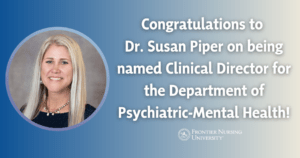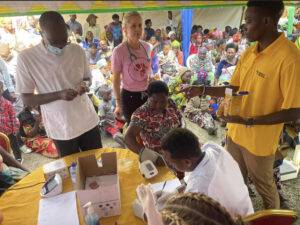At the heart of Frontier Nursing University is a talented and diverse community of students, alumni, faculty, staff, couriers and preceptors. Spotlight blogs feature members of our FNU community who are focused on the mission of educating nurse-midwives and nurse practitioners to deliver quality healthcare to underserved and rural populations.

FNU DNP Student Ashley Parker, MSN, PMHNP-BC
Frontier Nursing University student Ashley Parker, MSN, PMHNP-BC, was recently selected for the 2023-2024 Substance Abuse and Mental Health Service Administration (SAMHSA) Minority Fellowship Program. A first-year doctor of nursing practice student at FNU, Parker’s selection is a testament to her dedication toward advancing mental health care, particularly for underrepresented minority groups.
The SAMHSA Minority Fellowship Program aims to increase the number of post-baccalaureate behavioral health nurses from underrepresented ethnic minority groups. By fostering leadership, evidence-based research and culturally competent services, the program strives to eliminate health disparities in behavioral health disorders. The program emphasizes integrated approaches, acknowledging the mental and physical health needs of all ethnic/minority populations.
Through her selection, Parker will benefit from stipends, dissertation support, mentoring, career guidance, research workshops and interactions with experts in various disciplines. The program is designed to shape the careers of Fellows, providing leadership seminars, conferences and career enhancement opportunities.
Parker serves as the lead psychiatric-mental health nurse practitioner (PMHNP) at a 60-bed extended acute care behavioral health facility.
“I always tell my clients , ‘You’re the expert on you, you lead, I help.’,” said Parker. “It’s the way I build rapport and give them choices so that they can have a sense of autonomy in their treatment planning.”
With a rich educational background, including a bachelor’s degree in psychology from Temple University, a Bachelor of Science in Nursing from Drexel University, and a Master of Science in Nursing from Wilkes University, Parker brings a wealth of knowledge to her doctoral studies.
Recognized for her exceptional compassionate care, Parker received the Daisy Award while working with an Adult Psychiatric Crisis unit at Thomas Jefferson University in 2020. With 15 years of experience in mental health, she specializes in thought and mood disorders, particularly bipolar and schizophrenia, with comorbid substance use disorder.
Parker is an active member of prominent organizations such as the American Nurses Association, American Psychiatric Nurses Association, and the American Association of Nurse Practitioners. She also leads mental health clinicals for Bachelor of Nursing Students at Kennesaw State University.
Passionate about reducing stigmatization, Parker focuses on educating patients and their families on navigating newly diagnosed mental health disorders. Her commitment to crisis prevention is evident through her certification in crisis prevention training, where she has imparted knowledge to numerous employees at major psychiatric crisis hospitals.
As a SAMHSA Minority Fellowship Program Fellow, Parker will contribute to the program’s mission by integrating the science of early intervention and prevention, treatment and recovery into her doctoral research. Her focus on reducing crisis hospitalization aligns with the program’s goals of promoting culturally relevant care and addressing mental health disparities.
Thank you, Ashley, for your dedication to mental health care, as exemplified through your participation in this distinguished fellowship.
To learn more about the SAMHSA Minority Fellowship Program, visit emfp.org.
Learn more about advanced nursing degrees and specialties at Frontier Nursing University. Subscribe to our blog for the latest news and events at FNU and to get inspired with stories featuring our alumni, students, faculty, preceptors and staff!



 The schedule of a healthcare professional can be challenging to navigate. Yet, Mara-Joanne Derinor manages to work as a
The schedule of a healthcare professional can be challenging to navigate. Yet, Mara-Joanne Derinor manages to work as a 







 Vanessa Cameron works for Vanderbilt University Medical Center in Nursing Education & Professional Development. She is also attending George Washington University and progressing towards a PhD in Nursing with an emphasis on ableism in nursing. After becoming disabled in April 2021, Vanessa’s worldview and perspective changed, and a recognition of the ableism present within healthcare and within the culture of nursing was apparent. She has been working since that time to provide educational foundations for nurses about disability and ableism, provide support for fellow disabled nursing colleagues, and advocate for the disabled community within healthcare settings to reduce disparities.
Vanessa Cameron works for Vanderbilt University Medical Center in Nursing Education & Professional Development. She is also attending George Washington University and progressing towards a PhD in Nursing with an emphasis on ableism in nursing. After becoming disabled in April 2021, Vanessa’s worldview and perspective changed, and a recognition of the ableism present within healthcare and within the culture of nursing was apparent. She has been working since that time to provide educational foundations for nurses about disability and ableism, provide support for fellow disabled nursing colleagues, and advocate for the disabled community within healthcare settings to reduce disparities. Dr. Lucinda Canty is a certified nurse-midwife, Associate Professor of Nursing, and Director of the Seedworks Health Equity in Nursing Program at the University of Massachusetts Amherst. She earned a bachelor’s degree in nursing from Columbia University, a master’s degree from Yale University, specializing in nurse-midwifery, and a PhD from the University of Connecticut. Dr. Canty has provided reproductive health care for over 29 years. Her research interests include the prevention of maternal mortality and severe maternal morbidity, reducing racial and ethnic health disparities in reproductive health, promoting diversity in nursing, and eliminating racism in nursing and midwifery.
Dr. Lucinda Canty is a certified nurse-midwife, Associate Professor of Nursing, and Director of the Seedworks Health Equity in Nursing Program at the University of Massachusetts Amherst. She earned a bachelor’s degree in nursing from Columbia University, a master’s degree from Yale University, specializing in nurse-midwifery, and a PhD from the University of Connecticut. Dr. Canty has provided reproductive health care for over 29 years. Her research interests include the prevention of maternal mortality and severe maternal morbidity, reducing racial and ethnic health disparities in reproductive health, promoting diversity in nursing, and eliminating racism in nursing and midwifery. Dr. Lisa Meeks is a distinguished scholar and leader whose unwavering commitment to inclusivity and excellence has significantly influenced the landscape of health professions education and accessibility. She is the founder and executive director of the DocsWithDisabilities Initiative and holds appointments as an Associate Professor in the Departments of Learning Health Sciences and Family Medicine at the University of Michigan.
Dr. Lisa Meeks is a distinguished scholar and leader whose unwavering commitment to inclusivity and excellence has significantly influenced the landscape of health professions education and accessibility. She is the founder and executive director of the DocsWithDisabilities Initiative and holds appointments as an Associate Professor in the Departments of Learning Health Sciences and Family Medicine at the University of Michigan. Dr. Nikia Grayson, DNP, MSN, MPH, MA, CNM, FNP-C, FACNM (she/her) is a trailblazing force in reproductive justice, blending her expertise as a public health activist, anthropologist, and family nurse-midwife to champion the rights and health of underserved communities. Graduating with distinction from Howard University, Nikia holds a bachelor’s degree in communications and a master’s degree in public health. Her academic journey also led her to the University of Memphis, where she earned a master’s in medical anthropology, and the University of Tennessee, where she achieved both a master’s in nursing and a doctorate in nursing practice. Complementing her extensive education, she completed a post-master’s certificate in midwifery at Frontier Nursing University.
Dr. Nikia Grayson, DNP, MSN, MPH, MA, CNM, FNP-C, FACNM (she/her) is a trailblazing force in reproductive justice, blending her expertise as a public health activist, anthropologist, and family nurse-midwife to champion the rights and health of underserved communities. Graduating with distinction from Howard University, Nikia holds a bachelor’s degree in communications and a master’s degree in public health. Her academic journey also led her to the University of Memphis, where she earned a master’s in medical anthropology, and the University of Tennessee, where she achieved both a master’s in nursing and a doctorate in nursing practice. Complementing her extensive education, she completed a post-master’s certificate in midwifery at Frontier Nursing University.









 Dr. Tia Brown McNair is the Vice President in the Office of Diversity, Equity, and Student Success and Executive Director for the Truth, Racial Healing, and Transformation (TRHT) Campus Centers at the American Association of Colleges and Universities (AAC&U) in Washington, DC. She oversees both funded projects and AAC&U’s continuing programs on equity, inclusive excellence, high-impact practices, and student success. McNair directs AAC&U’s Summer Institutes on High-Impact Practices and Student Success, and TRHT Campus Centers and serves as the project director for several AAC&U initiatives, including the development of a TRHT-focused campus climate toolkit. She is the lead author of From Equity Talk to Equity Walk: Expanding Practitioner Knowledge for Racial Justice in Higher Education (January 2020) and Becoming a Student-Ready College: A New Culture of Leadership for Student Success (July 2016 and August 2022 Second edition).
Dr. Tia Brown McNair is the Vice President in the Office of Diversity, Equity, and Student Success and Executive Director for the Truth, Racial Healing, and Transformation (TRHT) Campus Centers at the American Association of Colleges and Universities (AAC&U) in Washington, DC. She oversees both funded projects and AAC&U’s continuing programs on equity, inclusive excellence, high-impact practices, and student success. McNair directs AAC&U’s Summer Institutes on High-Impact Practices and Student Success, and TRHT Campus Centers and serves as the project director for several AAC&U initiatives, including the development of a TRHT-focused campus climate toolkit. She is the lead author of From Equity Talk to Equity Walk: Expanding Practitioner Knowledge for Racial Justice in Higher Education (January 2020) and Becoming a Student-Ready College: A New Culture of Leadership for Student Success (July 2016 and August 2022 Second edition).